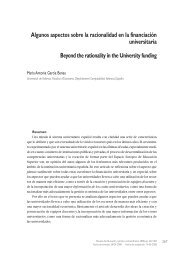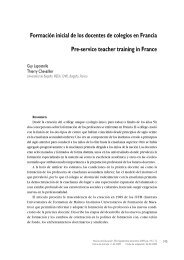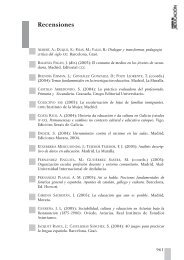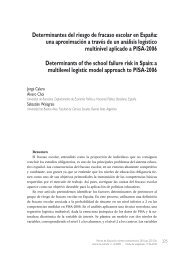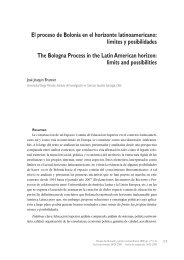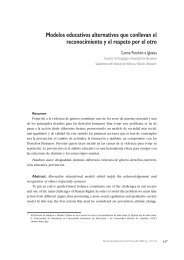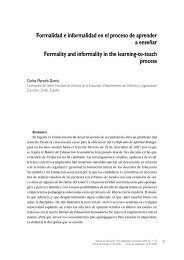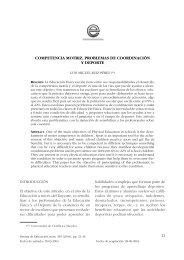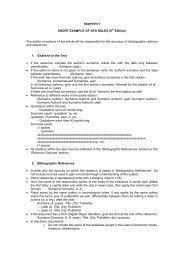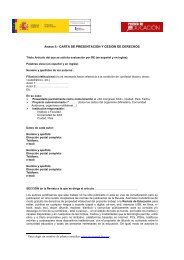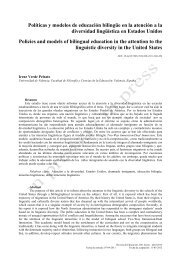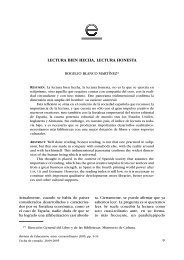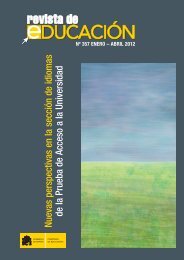Teacher Education Curriculum of Secondary School Teachers
Teacher Education Curriculum of Secondary School Teachers
Teacher Education Curriculum of Secondary School Teachers
Create successful ePaper yourself
Turn your PDF publications into a flip-book with our unique Google optimized e-Paper software.
• Research studies, consist <strong>of</strong> methodological studies, a BA thesis and a MA thesis.• Pedagogical studies, (min. 60 ECTS) are obligatory for all teachers. They also include teachingpractice and orientation to research in education.• Communication, language and ICT studies are also obligatory.• The preparation <strong>of</strong> a personal study plan is a new element in university studies since 2005 inFinland. Its main function is to guide students to develop their own effective programmes and careerplans, and to tutor them in achieving their goals.• Optional studies may cover a variety <strong>of</strong> different courses through which students seek to pr<strong>of</strong>ile theirstudies and qualifications.Table II. Main components <strong>of</strong> the teacher education programs for secondary school teachers.<strong>Secondary</strong> school teacher education programmeBachelor’sDegree180 ECTSMaster’sDegree120 ETCSTOTAL300 ETCSSubject teachers’ pedagogical studies (minor)- basics <strong>of</strong> teaching methods and evaluation- support <strong>of</strong> different kind <strong>of</strong> learners- latest research results and research methods <strong>of</strong>teaching and learning- cooperation with different partners andstakeholders25-30(Including supervisedteaching practice)30-35(Including a minimum<strong>of</strong> 15 ETCS supervisedteaching practice)60Academic studies in different disciplines- a major60(including BA thesis, 6-10)60-90(including MA thesis,20-40)120 – 150Academic studies in different disciplines- 1-2 minors25-60 0-30 25-90Language and communication studies, including ICTPractice in working life35 - 40 0-30 35-70Preparation and updating a personal study planOptional studiesPedagogical studiesThe distinction between class teachers (primary school) and subject teachers (secondary school) is retained,but the structures <strong>of</strong> the respective degree programmes will allow them to take very flexible routes to includeboth in the same programme or to permit a later qualification in either direction. The pedagogical studies (60ECTS) are obligatory for qualification as a teacher and are approximately the same for both primary andsecondary teachers. According to legislation, pedagogical studies must be studies in the science <strong>of</strong> educationwith an emphasis on didactics. Pedagogical studies can be part <strong>of</strong> the degree studies, or they can be takenseparately after completion <strong>of</strong> the Master’s degree.The goal <strong>of</strong> pedagogical studies is to create opportunities to learn pedagogical interaction, how todevelop one’s own teaching skills and how to learn to plan, teach and evaluate teaching in terms <strong>of</strong> thecurriculum, the school community and the age and learning capacity <strong>of</strong> the pupils. Students should also learnhow to cooperate with other teachers, parents and other stakeholders and representatives <strong>of</strong> the welfaresociety (www.helsinki.fi/vokke).
As a part <strong>of</strong> the Bologna process teachers’ pedagogical studies were reformed in all Finnishuniversities. The module <strong>of</strong> pedagogical studies is a Minor in secondary school teacher education andconsists <strong>of</strong> 60 ECTS. Jakku-Sihvonen et al., (2009) have analysed the core elements <strong>of</strong> the pedagogicalstudies in 12 teacher education departments <strong>of</strong> Finnish universities. The following main elements werefound: (1) theoretical substance in education, (2) supervised teaching practice, (3) studies for researchcompetence, and (4) optional studies. The results by credits were as follows:• The main element <strong>of</strong> the curricula is theoretical substance in education. Credits varyfrom 25 to 40 ECTS.• The amount <strong>of</strong> supervised teaching practice varies from 12 to 25 ECTS.• The amount <strong>of</strong> the studies in research readiness varies 3 to 12 ECTS.• The optional studies are included only in four curricula. The amount <strong>of</strong> the optionalstudies is in all cases less than 10 ECTS.The research group (Jakku-Sihvonen et al., 2009) also analysed how the amount <strong>of</strong> the theoreticalsubstance in education in those 12 curricula was divided into following the traditional definition <strong>of</strong> subdisciplines<strong>of</strong> the Science <strong>of</strong> <strong>Education</strong>: didactics, educational psychology, sociology <strong>of</strong> education, thephilosophy <strong>of</strong> education, history <strong>of</strong> education and comparative education (see Jakku-Sihvonen, 2007, p.218), didactics forms the largest content area <strong>of</strong> studies in most <strong>of</strong> the curricula. The amount <strong>of</strong> studies indidactics varies from 9 to 20 ECTS. The number <strong>of</strong> credits in educational psychology varies from 3 to 11ECTS. The number <strong>of</strong> credits in sociology <strong>of</strong> education varies from 1 to 12 ECTS. In eight curricula, thereare obligatory studies in the philosophy <strong>of</strong> education. (Jakku-Sihvonen et al., 2009, p. 10-13)In secondary school teacher education the component <strong>of</strong> didactics is focused on issues how to teachschool subjects to different learners. In American educational literature a corresponding element is very <strong>of</strong>tencalled as pedagogical content knowledge. In the Finnish case these studies can have very close relationshipwith learning research, academic discipline studies and teaching methods. A typical feature is a researchorientation. <strong>Teacher</strong>s are seen as active pr<strong>of</strong>essionals who have a right and obligation to develop their work.The aim <strong>of</strong> teacher education is that teachers internalise an attitude <strong>of</strong> pedagogical thinking.An important task <strong>of</strong> pedagogically oriented studies is to educate teachers who are able to study anddevelop their own research-based practices. For this reason, the modules on behavioural research methodsare also obligatory for subject teachers. The critical scientific literacy <strong>of</strong> teachers and their ability to useresearch methods are considered to be crucial. Accordingly, Finland’s teacher education programmes requirestudies <strong>of</strong> both qualitative and quantitative research traditions. The aim <strong>of</strong> these studies is to train students t<strong>of</strong>ind and analyse problems they may expect to face in their future work.Pr<strong>of</strong>essors and supervisors <strong>of</strong> Finnish teacher education have the responsibility to guide students in theresearch-oriented aspects <strong>of</strong> their education. The main object <strong>of</strong> this guidance is not the completion <strong>of</strong>research studies itself, but actually to further the process by which students come to see themselves asactively studying and working subjects. In this aspect <strong>of</strong> the degree programme, the processes <strong>of</strong> activeworking and thinking are integrated in various complex and sometimes unexpected ways. The aim <strong>of</strong> theguiding process is to help students discover and tap their own intellectual resources and to make them betterable to work in changing contexts (Niemi and Jakku-Sihvonen, 2006, p. 37).Research studies in majorThe crucial role <strong>of</strong> subject faculties or departments is in ascertaining the high level <strong>of</strong> content areaknowledge for subject teachers. This is highlighted by the writing <strong>of</strong> the Master’s thesis at the subjectdepartment. The thesis facilitates the future teacher’s access to research-oriented work, and emphasises thecreation <strong>of</strong> how new knowledge in their field <strong>of</strong> teaching and learning. Most important is the goal <strong>of</strong>preparing future teachers to understand new achievements <strong>of</strong> scientific research autonomously (Meisalo,2007, p. 166).Traditionally, in the subject departments at various faculties the focus has been on in educating futureresearchers and little on the future needs <strong>of</strong> those students who had chosen teaching careers. However, thissituation is changing as many faculties and universities have recognised the importance <strong>of</strong> teacher education.There are also chairs at a number <strong>of</strong> subject departments where the chairholder’s responsibility is to
supervise teacher education at the department (Meisalo, 2007, p. 166). There are also more and moreexamples <strong>of</strong> joint research supervision in secondary teacher education. One supervisor can be from theacademic discipline faculty and another from the education faculty. Topics <strong>of</strong> student teachers’ Master thesiscan be closely related with teaching and learning <strong>of</strong> school subjects.Teaching practice<strong>Teacher</strong>s’ pedagogical studies also include supervised teaching practice (approx. 20 ECTS). The aim <strong>of</strong>guided practical studies is to support students in their efforts to acquire pr<strong>of</strong>essional skills in researching,developing and evaluating teaching and learning processes. In addition, students should be able to reflectcritically on their own practices and social skills in teaching and learning situations. During supervisedpractical studies, students should meet pupils and students from various social backgrounds andpsychological orientations and have opportunities to teach them according to the curriculum.Teaching practice is integrated with all levels <strong>of</strong> teacher education time. It is supervised byuniversity teachers, university training school teachers or local school teachers depending on the phase <strong>of</strong>practice (Jyrhämä, 2006) (Figure I).Figure II. Teaching practice in Finnish teacher education curriculaStudyyears54Advanced Practicum (MA level, 8 ECTS):Different options for developing expertise,can be connected with the Master’s ThesisMainly in Municipal field schools321Intermediate Practicum (BA level, 12ECTS):Starting with specific subject areas, movingtowards more holistic and pupil-centredapproachesUniversity teacher training schoolsPracticum integrated with theoretical studiesThe main principle is that practice should start as early as possible and support student teachers’growth towards expertise. In the beginning it guides student teachers to observe school life and the pupilsfrom an educational perspective, then it focuses on specific subject areas and pupils’ learning processes.Finally it supports student teachers as they take holistic responsibility in their teaching and schools. Thisperiod can be tightly connected with their research studies and Master’s thesis.Universities’ teacher training schools called also Normal schools play a crucial role in the Finnishteacher education. The Normal <strong>School</strong>s are state schools and their teachers have a different status thanteachers in other schools. The teachers have a dual role: on one hand teach their pupils and on the other, theysupervise and mentor student teachers. Many teachers are active in research and development work and aremembers <strong>of</strong> teams that produce learning materials for schools. (Meisalo 2007, p.167)
The above features are described as goals <strong>of</strong> teacher training schools, but there is frequent critiquebased on the demand <strong>of</strong> having at least a substantial part <strong>of</strong> the teaching practice in more typical schools.Actually, parallel to the Normal <strong>School</strong>s there have been so-called field schools with an importantcontribution to the capacity and volume <strong>of</strong> teacher education in the times <strong>of</strong> high demand <strong>of</strong> qualifiedteachers. (Meisalo, 2007, p. 167)Admission to secondary school teacher educationIn Finland all universities have Numerus Clausus system. It means that the universities accept only a certainnumber <strong>of</strong> applicants and it is related to the amount <strong>of</strong> degrees negotiated with the Ministry <strong>of</strong> <strong>Education</strong>.The universities are accountable for their results and funded according to it. Usually only one forth fromapplicants can be accepted. <strong>Teacher</strong> education, especially class teacher education, is one <strong>of</strong> the most desiredstudy programs. Because <strong>of</strong> a big amount <strong>of</strong> applicants, only 15% can be accepted. Also secondary teachereducation has become more and more popular in most subjects. In general, admission to the university isdifficult for young people wishing to pursue a career as a subject teacher as only a small percentage <strong>of</strong> theapplicants is granted admission to studies in the relevant faculties. This is true particularly for biologicalsubjects, but there have been recently problems in recruiting talented students in mathematics, physics andchemistry and in some foreign languages. There have been many efforts to attract new students and this hasresulted in a change from the «elimination approach» to a «recruitment approach» in the organisation <strong>of</strong>student admission programmes <strong>of</strong> the faculties. These efforts include utmost flexibility in timing <strong>of</strong> studiesand arranging entrance tests in some faculties occasionally as <strong>of</strong>ten as three times a year. (Meisalo 2007, p.172)Pedagogical studies are normally put in the individual study plans <strong>of</strong> teacher students between themiddle <strong>of</strong> subject studies e.g., during the third and fourth study year. However, it is possible to take first aMaster’s degree studying at the subject faculty only and apply for entrance to pedagogical studies afterwards.All students applying for teacher education programmes are tested and interviewed personally. (Meisalo2007, p. 172)A long way to understand pr<strong>of</strong>essional development <strong>of</strong> secondary schoolteachers<strong>Teacher</strong> education for secondary school teachers has not proceeded without tensions. There have beencontradictory missions, in some cases even strong conflicts between faculties <strong>of</strong> academic disciplines andeducation. A major reason <strong>of</strong> tensions has focus on a questions how much teachers need pure academiccontent knowledge and how much pedagogical studies. From a viewpoint <strong>of</strong> academic disciplines contentknowledge has been the most important in teachers’ work and from educational faculties have stressedteachers’ capacity to be interaction with students and to take care <strong>of</strong> learners. This polarity has decreasedduring last twenty years little by little. Some reasons <strong>of</strong> this change can be seen at least from the followingtrends:Focus on researchRepresentatives <strong>of</strong> the various faculties <strong>of</strong> education have become more and more into consensus about theprinciple that teacher education must equip teachers with research-based knowledge. In secondary schoolteacher education pedagogical content knowledge has been a connective element. There has been growinginterest in research on subject pedagogy/didactics. Meisalo writes: «One indication <strong>of</strong> this is the organising<strong>of</strong> research symposia and conferences. There has been a long tradition <strong>of</strong> more than 100 years <strong>of</strong> meetings
and conferences for practicing teachers including aspects <strong>of</strong> in-service training. However, research-orientedconferences and the foundation <strong>of</strong> associations <strong>of</strong> researchers started only in the eighties. Some <strong>of</strong> the firstmeetings <strong>of</strong> this type were the meeting <strong>of</strong> researchers on mathematics education in Jyväskylä and <strong>of</strong>researchers on physics and chemistry education in Helsinki in 1982. At the same time, departments <strong>of</strong>teacher education started publishing a report series for applied educational research. They <strong>of</strong>fered a forumfor publication <strong>of</strong> research papers even by subject teacher educators» (Meisalo, 2007, p. 174).The Finnish Association <strong>of</strong> Mathematics and Science <strong>Education</strong> Research was founded the next yearwhen the Institute <strong>of</strong> <strong>Education</strong>al Research in Jyväskylä also launched publication <strong>of</strong> a series <strong>of</strong> yearbooks <strong>of</strong>subject-area oriented research. Similar activities arose even in other subject areas and in 1987 the firstsymposium covering all subjects was held in Helsinki with the theme Subject Didactical Research and theFuture. It was a joint initiative <strong>of</strong> the experts <strong>of</strong> mother tongue didactics and didactics <strong>of</strong> mathematicalsubjects at the Helsinki Department <strong>of</strong> <strong>Teacher</strong> <strong>Education</strong>. These symposia became an annual tradition,organised mostly in Helsinki. These forums provided researchers interested in subject didactics anopportunity to discuss and interact with other researchers and active teachers. (Meisalo, 2007, p. 174)National doctorate schools for teachersThe Finnish higher education policy has invested in national doctoral schools since 1995. They provide somefull time research posts to young researchers and a high quality network for a larger group <strong>of</strong> doctoralstudents who are reviewed by expert panels and have other kind <strong>of</strong> funding arrangements. There has been anational doctoral school <strong>of</strong> education including teacher education. In addition more subject specific schoolshave been established, e.g., a programme called Doctoral <strong>School</strong> <strong>of</strong> Mathematics, Physics and Chemistry<strong>Teacher</strong>s which started in September 1995 and was active to the end <strong>of</strong> 2001. In according to Meisalo (2007,p. 169) similar activities started again in the beginning <strong>of</strong> 2003 and it seems that there are necessary fundsavailable at least to the end <strong>of</strong> 2011. The doctoral schools have as their goals to educate experts in educationin specific subject areas. Doctoral schools have created networks <strong>of</strong> experts in research on teaching andlearning in the subject areas concerned. They have promoted international contacts and assisted in publishingin international research journals. Implementation <strong>of</strong> modern technologies both in the daily work <strong>of</strong> subjectteachers and in the research projects has been among the goals <strong>of</strong> doctoral schools following the <strong>of</strong>ficialgoals <strong>of</strong> the information society. The type <strong>of</strong> research is supposed to be oriented to the development <strong>of</strong> thepractice <strong>of</strong> teaching, new learning materials, etc. Postgraduate studies are assigned to the partner universities;the school organises seminars mainly on methods <strong>of</strong> educational research. There can also be interaction overthe Internet on the problems <strong>of</strong> research projects in the meantime. Many teachers studying in postgraduateschools have a substantial teaching experience. On one hand, it is positive as they have had high competencein applying their research outcomes in school practice both themselves and through in-service training. Onthe other hand, it means that doctoral students are not young and there are demands that the median age <strong>of</strong>doctorants should be lower in the future (Meisalo, 2007, p. 170).<strong>Teacher</strong>s are learnersDuring recent years much effort has been expended to promote the interaction and co-operation <strong>of</strong> differentdepartments and faculties involved in teacher education. It may be said that the emphasis on goal setting hasgradually changed from teaching different content areas to educating top-quality teachers. Pr<strong>of</strong>essionalgrowth is a long process and it is important that student teachers receive orientation to their future workalready during their first years <strong>of</strong> studies at the subject departments (Meisalo, 2007).The knowledge about teachers’ pr<strong>of</strong>essional growth has change also the attitude to secondary schoolteacher education. To become a teacher is a long learning process (e.g. Niemi 1988; Hargreaves 1994; Niemi& Kohonen, 1995; Niemi, 2008). <strong>Teacher</strong>s need the confidence to work with learners in real situations, andstudent teachers <strong>of</strong>ten ask for very practical advice for their teaching practice. The Finnish teacher educationaims to integrate teaching practice to different levels <strong>of</strong> theoretical studies.The recent research <strong>of</strong> expertise has revealed that there are different phases in the development intoexpertise (Dreyfys & Dreyfus 1986). Student teachers also need different kinds <strong>of</strong> support in different phases<strong>of</strong> their development. Many researchers have also stressed that expertise is the integration <strong>of</strong> different kinds
<strong>of</strong> knowledge. Davenport and Prusak (1998) have found that an expert needs codified knowledge andorganised <strong>of</strong>ficial and literally transferable knowledge. In addition, the development <strong>of</strong> expertise needs rolemodels, observing experts, tacit knowledge, a social network and even good stories <strong>of</strong> successful practice.Davenport and Prusak (1998) point out that experts’ knowledge is deep personal knowledge which has beentested in practical situationsAccording to Schön (1991), experts always face problems in situations that are unique and consist <strong>of</strong>uncertainties, value conflicts and other tensions because <strong>of</strong> complexity. They work in complex situations andtherefore need various kinds <strong>of</strong> evidence. This sets special requirements on their knowledge base. Experts’knowledge is rational knowledge, but this is not sufficient. They also need principles, rules and models, andto know how to apply scientific theories and techniques to complex problems.Working as an expert means that the expert has the knowledge and practical abilities to work incomplex situations. In addition, they need confidence in two complementary ways (Isopahkala-Brunet,2004). They need the self-confidence to carry out their expertise in demanding unique situations. They alsoneed to implement their expertise in such a way that their customers, stakeholders and colleagues trust them.In the teaching pr<strong>of</strong>ession this means that students and parents and even society can trust teachers’ expertise.Even though teachers need many specific skills, they also need a comprehensive idea or vision <strong>of</strong> whattheir work as an educational expert means. <strong>Teacher</strong>s need to understand the complexity <strong>of</strong> educationalprocesses and face evidence that is coming from different sources. They need research-based and researchinformedknowledge, but they also need to be open to acquiring and assessing local evidence. Scardamaliaand Bereiter (2003) have examined the behaviour <strong>of</strong> experts. The feature that really distinguishes expertsfrom others is their approach to new problems. The pattern recognition and learned procedures that lead tointuitive problem solving are only the beginning. The expert invests in what Bereiter and Scardamalia callprogressive problem solving, that is, tackling problems. That increases expertise rather than reducingproblems to previously learned routines.In the Finnish teacher education teachers’ competence must include a readiness to analyse the situationlike a researcher and to make conclusions and decisions to act or to change something in a given situation.The pre-service teacher education curriculum provides a foundation, but without research-oriented in-servicetraining, teachers’ potentiality to renew and develop their own pr<strong>of</strong>ession will stagnate. There are goodexamples <strong>of</strong> how in-service training has supported teachers’ work in local schools, and these activities aretightly connected with research projects (Husso & Korpinen & Asunta 2006). The LUMA Centre(http://www.helsinki.fi/luma/) is also an example <strong>of</strong> cross-boundary activities connecting research andteachers’ work in schools. It is serving science teachers, students and researchers. The centre is coordinatedby the Faculty <strong>of</strong> Science in the University <strong>of</strong> Helsinki promoting the teaching <strong>of</strong> biology, chemistry,geography, mathematics, physics and technology and enhancing interaction between schools, universitiesand business and industry. The aim is cross-disciplinary co-operation. The LUMA Centre also seeks toencourage children and young people to become involved in scientific activities. The name LUMA comesfrom the words referring to science and mathematics (LU= Luonnontieteet in Finnish, science in English,MA= Matematiikka in Finnish, mathematics in English).Research has been integrated into the activities <strong>of</strong> the LUMA Centre. Disseminating new researchfindings is a key in supporting teachers’ lifelong learning. This is done with the help <strong>of</strong> LUMA Science Fairsand summer courses, and by <strong>of</strong>fering the opportunity to take part in research and to follow newdevelopments through the newsletter, the webzine Luova (Creative) and Master’s theses published by theresource centres.The LUMA Centre encourages teachers to play an active role in developing their own teaching usingthe latest research and being also an action researcher in their own schools. <strong>Teacher</strong>s are provided with news<strong>of</strong> the latest new research knowledge, they become with familiar «this month’s researcher», they haveinformation <strong>of</strong> science and education conferences and events. The Centre organises also annual conferences,workshops and summer courses for teachers. The main principle is that researchers and teachers are workingtogether.The main principles <strong>of</strong> curriculum construction
Each society has identified certain important task areas that require special competence. A society givesthese tasks to a qualified group <strong>of</strong> individuals, i.e. to pr<strong>of</strong>essionals. The members <strong>of</strong> this pr<strong>of</strong>ession areresponsible for the duties <strong>of</strong> the task area and the further development <strong>of</strong> the pr<strong>of</strong>ession. The main criteria <strong>of</strong>the pr<strong>of</strong>ession are that its representatives have a high level, usually a tertiary level, <strong>of</strong> education, and it has amoral code that they must meet in exercising their pr<strong>of</strong>ession. Because <strong>of</strong> their high responsibilities andspecial competences, the representatives <strong>of</strong> the pr<strong>of</strong>ession also have the right and obligation to develop theirtask area in society.In Finland teachers are expected to be able to take an active role in evaluating and improving schoolsand their learning environments. They are also expected to refresh their pr<strong>of</strong>essional skills, to cooperate withparents and other stakeholders, and to be active citizens (<strong>Teacher</strong> Development <strong>Education</strong> Programme,2001).This chapter summarizes the main principles that are important also in future Finnish teacher educationin connection with the Bologna process. The framework <strong>of</strong> Finnish teacher education has been designed fornational contexts while, at the same time, taking the global perspective into account (Niemi, 1999; Niemi2000; Räsänen, 1999).A research-based approach as a main guidelineThe main principle <strong>of</strong> teacher education focuses on research-based education. <strong>Teacher</strong> education must equipteachers with research-based knowledge and with skills and methods for developing teaching, cooperating atschool and communicating with parents and other stakeholders.• <strong>Teacher</strong>s need a pr<strong>of</strong>ound knowledge <strong>of</strong> the most recent advances <strong>of</strong> research in the subjects theyteach. In addition, they need to be familiar with the latest research on how something can be taughtand learnt. Interdisciplinary research on subject content knowledge and pedagogical contentknowledge provides the foundation for developing teaching methods that can be adapted to suitdifferent learners.• <strong>Teacher</strong> education in itself should also be an object <strong>of</strong> study and research. This research shouldprovide knowledge about the effectiveness and quality <strong>of</strong> teacher education implemented by variousmeans and in different cultural contexts.• The aim is that teachers internalise a research-orientated attitude towards their work. This means thatteachers learn to take an analytical and open-minded approach to their work, that they drawconclusions based on their observations, and experiences and that they develop their teaching andlearning environments in a systematic way.High quality academic subject matter knowledge and pedagogical knowledgeOne <strong>of</strong> the most important roles <strong>of</strong> teachers is to open pathways to cultural richness and understanding.<strong>Teacher</strong>s have to be familiar with the most recent knowledge and research about the subject matters. Theyalso have to know how subject matters can be transformed in relevant ways to benefit different learners andhow it can help learners create foundations on which they can build their lifelong learning. This means thatteachers need the latest research results and knowledge in pedagogy. They should have a thoroughunderstanding <strong>of</strong> human growth and development and they need knowledge <strong>of</strong> the methods and strategiesthat can be used to teach different learners. In addition, teachers have to be familiar with the curricula andlearning environments on educational institutions. They also have to know about learning in non-formaleducational settings, such as in open learning and labour market contexts. <strong>Teacher</strong>s should have the latestknowledge <strong>of</strong> educational technology and they need to be able to apply ICT in their work.In updating the core contents <strong>of</strong> the Finnish teacher education, consideration was given to the reformsin national educational governance and the new orientation toward transferable skills and the educationaldemands <strong>of</strong> a multicultural knowledge society. In all educational systems at all levels, today’s teachers andteacher educators are being required to act as responsible educators in a multicultural society. The need tounderstanding different subcultures, religions and values is causing new and difficult demands to teachersand teacher education. Intercultural learning is important for every individual in every culture in a world that
we now call ‘global’ (Kaikkonen, 1996; Watts & Smolicz, 1977; Räsänen, 1999). <strong>Teacher</strong>s also must have agood knowledge <strong>of</strong> history and cultural roots for promoting intercultural understanding. <strong>Teacher</strong> educationcurricula and programmes should give students opportunities to learn how to take responsibility for ethicalchoices (e.g. Aloni, 2002, pp. 176-182; Atjonen, 2004,139; Oser, 1994). This is a topic that is worth studyingfor its own sake for the purpose <strong>of</strong> developing a scientifically sound foundation for a course or module inapplied intercultural ethics in teacher education.In general, working with different types <strong>of</strong> learners has been a dominant issue in Finland because <strong>of</strong>efforts to make Finnish society more inclusive. Developing the ability to cooperate with multi-pr<strong>of</strong>essionalnetworks, especially in terms <strong>of</strong> inclusive education, should be an important objective in teacher training(Lappalainen & Mäkihohko 2004; <strong>Teacher</strong> <strong>Education</strong> Development Programme, 2001 ).Metaknowledge – promoting active and collaborative learning<strong>Teacher</strong> education is a very intensive educational process. Within five years, students should understand themain functions <strong>of</strong> the teaching pr<strong>of</strong>ession and be able to set individual goals for their own personal andacademic development with a positive orientation toward the application <strong>of</strong> theoretical knowledge. Learningto learn and helping other people to learn are both demanding tasks in themselves (e.g. Niemi, 2002).The concept <strong>of</strong> knowledge is now different from earlier static, transmitted contents. We nowunderstand knowledge to be ever renewable and to be construed jointly together with other learners.<strong>Teacher</strong>s need metaknowledge <strong>of</strong> learning processes: they have to know what learning is from differenttheoretical viewpoints and how learners can be supported to find strategies to handle their own learning andto become active learners. They also need metaknowledge <strong>of</strong> collaborative learning processes. This involvesknowing how knowledge can be construed in co-operation with others and knowing what the socialcomponents <strong>of</strong> learning processes are.The social and moral code <strong>of</strong> the teaching pr<strong>of</strong>ession<strong>Teacher</strong>s’ work is always very context-bound, depending on learner age level, cultural conditions, availableresources and the contents that they are mediating to learners. <strong>Teacher</strong>s and teacher education are also clearlyrelated to national goals and purposes. The welfare and economy <strong>of</strong> the society definitely depend on thequality <strong>of</strong> educational outcomes, and these are associated with teachers’ competences.Besides being guided by <strong>of</strong> national and local community-based goals, teachers’ work also has moregeneric aims. They open doors and windows to cultural enrichment and help people to understand otherhuman beings and their cultural contexts. <strong>Teacher</strong>s are key actors in promoting human rights, justice anddemocracy in a global world (e.g. Aloni, 2002). In Europe, teachers have in important role in advancingintercultural understanding and mobility.Representatives <strong>of</strong> an ethical pr<strong>of</strong>ession<strong>Teacher</strong>s also have a key role in preparing a young generation as well as adult people to meet changingconditions (Niemi, 2000). The global world is very interdependent, and changes in technology, economy,politics, and security have immediate pr<strong>of</strong>ound consequences on people’s lives. All citizens should be giventools to analyse and manage these changes.As teachers are key actors in enabling their student to reach their full human potential, they exercisea strong influence on communities and societies (e.g. Aloni, 2002, p. 176-183). <strong>Teacher</strong>s are representatives<strong>of</strong> an ethical pr<strong>of</strong>ession and they have an important role fulfilling the promise democracy, social justice andhuman rights. Therefore, according to Carr and Hartnett (1996) teacher development should be based on thefollowing premises:• <strong>Teacher</strong> development must be connected with more general social and political theories about suchissues as democracy, social justice, equality and legitimacy. It has to demonstrate the implications <strong>of</strong>
a principled view <strong>of</strong> democracy not just for educational systems but also for the way in whicheducational institutions should be run. It also has to relate these ideas to curricula, pedagogy andassessment.• <strong>Teacher</strong> development must be located within a particular historical, political and educationaltradition and context. <strong>Teacher</strong>s do not work and reflect in a social vacuum. They act withininstitutions, structures and processes which have a past and a social momentum.• A theory <strong>of</strong> teacher education has to re-establish a democratic political agenda and to developconstituencies in the wider society for this work, so as to bring about changes as required.<strong>Teacher</strong>s need in their pr<strong>of</strong>ession a concept <strong>of</strong> culture which includes cultural knowledge andintercultural understanding. They also need to understand the factors that create social cohesion andexclusion in a society and how the teaching pr<strong>of</strong>ession plays an integral part in these processes. They have tobe aware <strong>of</strong> opportunities and ways to work together with other partners and stakeholders in formal and nonformaleducational contexts in order to provide learning opportunities to learners at various age levels. Theyalso need to be aware <strong>of</strong> value contradictions in society and educational institutions and they should beprepared to deal with moral and value-based issues.High quality pedagogical skills and reflection as a bridge between academic and pr<strong>of</strong>essionaldevelopmentAs pr<strong>of</strong>essionals, teachers need a lot practical skills that will enable them to mediate something toindividuals or groups and to construct knowledge jointly. The academic contents and practical skills must notbe seen as separate or exclusive; they are always complementary in the teaching pr<strong>of</strong>ession.<strong>Teacher</strong>s are working today in conditions where continuous change, cultural dispersion, and increasingdiversity in all areas <strong>of</strong> life are commonplace. The structures <strong>of</strong> families and working life have undergonesubstantial change. <strong>Teacher</strong>s are witnessing rapid and unforeseen changes in economic life, societalstructures, production, and information technologies. Security issues are very real. These phenomena reflecton students' lives and on the educational systems in all Western countries. <strong>Teacher</strong>s’ competence mustinclude a readiness to analyse these circumstances, to draw conclusions and to make decisions to adjust or tochange something in the situation. This means that the teacher needs a critical mind and the ability to reflect.Reflection can be in action or on action. The fact that many decisions have to be taken very rapidly, inaction, requires that teachers have internalised the pr<strong>of</strong>essional knowledge and moral code that are needed inacting in changing situations.ReferencesALONI, N. (2002). Enhancing Humanity. The philosophical foundations <strong>of</strong> humanistic <strong>Education</strong>. Boston:Kluwer Academic Publishers.ATJONEN, P. (2004). Pedagoginen etiikka koulukasvatuksen karttana ja kompassina (Pedagogical Ethics inTeaching). Finnish Society for <strong>Education</strong>al research:Turku. (In Finnish).CARR, W. & HARTNETT, A. (1996). <strong>Education</strong> and the struggle for democracy. The politic <strong>of</strong> educationalideas. Great Britain: Open University Press.COMMITTEE REPORT. (1975). Komiteamietintö. 1975. Vuoden 1973 opettajankoulutustoimikunnan mietintö.Helsinki. [The report <strong>of</strong> teacher education committee <strong>of</strong> the year 1973. Committee Report 1975:75].Ministry <strong>of</strong> <strong>Education</strong>.DAVENPORT, T. H. & PRUSAK. L. (1998) Working Knowledge: How Organizations Manage What TheyKnow. Cambridge, MA: Harvard Business <strong>School</strong> Press.DREYFUS, H. L. & DREYFUS S. E. (1986). Mind over machine. The Power <strong>of</strong> Human Intuition and Expertisein the Era <strong>of</strong> Computer, New York: Blackwell.
HARGREAVES, D. (1994). The new pr<strong>of</strong>essionalism: Synthesis <strong>of</strong> pr<strong>of</strong>essional and institutional development.Teaching and teacher education. An International Journal <strong>of</strong> Research and Studies 10 (4), 423–438.HUSSO, M-L & KORPINEN, E. & ASUNTA, T. (2006) <strong>Teacher</strong> Researcher Net – a Forum <strong>of</strong> InteractivePr<strong>of</strong>essionalism and Empowerment. In R. JAKKU-SIHVONEN & H. NIEMI (eds), Research-basedteacher education in Finland – reflections by Finnish teacher educators (103-122). Turku: Finnish<strong>Education</strong>al Research Association 2006.ISOPAHKALA-BOURET, U. (2005). Joy and struggle for renewal: A Narrative Inquiry into Expertise in Jobtransitions. University <strong>of</strong> Helsinki, Faculty <strong>of</strong> Behavioural Sciences, Department <strong>of</strong> <strong>Education</strong>,Research report 201.JAKKU-SIHVONEN, R. (2007). Curricula for Majoring in <strong>Education</strong>. In Jakku-Sihvonen, R. & Niemi,H. (Eds.)<strong>Education</strong> as Societal Contributor. Frankfurt am Main. Peter Lang GmbH, 207-226.JAKKU-SIHVONEN R. & NIEMI, H. (2006). Introduction to the Finnish education system and teachers’ work.In R. JAKKU-SIHVONEN & H. NIEMI (Eds.). Research-based <strong>Teacher</strong> <strong>Education</strong> in Finland- reflectionsby Finnish <strong>Teacher</strong> Educators (pp. 7-16) . Turku: Finnish <strong>Education</strong>al Research AssociationJAKKU-SIHVONEN, R. & NIEMI, H. (2007). Introduction. In R. JAKKU-SIHVONEN & H. NIEMI (Eds.)<strong>Education</strong> as Societal Contributor (pp. 9-20). Frankfurt am Main: Peter Lang.JAKKU-SIHVONEN, R. & TISSARI,V.& UUSIAUTTI, S. (2007). Curricula for class teachers and for subjectteachers – Core elements <strong>of</strong> the studies in <strong>Education</strong>. Didacta Varia. Helsinki University: Vol 13(2),2008, 3-16.JYRHÄMÄ, R. (2006). The Function <strong>of</strong> Practical Studies in teacher <strong>Education</strong>. In R. JAKKU-SIHVONEN ANDH. NIEMI (Eds.). Research-based <strong>Teacher</strong> <strong>Education</strong> in Finland- reflections by Finnish <strong>Teacher</strong>Educators (51-70). Turku: Finnish <strong>Education</strong>al Research Association.KAIKKONEN, P. (1996). Intercultural education as an integral part <strong>of</strong> the school curriculum and teachereducation. In H. NIEMI & K. TIRRI (Eds.) Effectiveness <strong>of</strong> teacher education. New challenges andapproaches to evaluation (pp. 115-125). Reports from the Department <strong>of</strong> <strong>Teacher</strong> <strong>Education</strong> inTampere University A 6.KANSANEN, P. (2003) <strong>Teacher</strong> education in Finland: current models and new developments. In M. MOON, L.VLÃSCEANU & C. BARROWS (Eds.). Institutional approaches to teacher education within highereducation in Europe: current models and new developments. Bucharest: Unesco-Cepes, 85 – 108.LAUKKANEN, R. (2006). Finnish Strategy for High-level <strong>Education</strong> for All. Paper presented at the conference<strong>Education</strong>al Systems and the Challenge <strong>of</strong> Improving Results. University <strong>of</strong> Lausanne, Lausanne,Switzerland, 15–16 September 2006.MEISALO.V. (2007). Subject teacher education in Finland: a Research-based approach – The role <strong>of</strong> Subjectdidactics and networking in teacher education. In JAKKU-SIHVONEN, R. & NIEMI, H. (Eds.) <strong>Education</strong>as Societal Contributor. Frankfurt am Main: Peter Lang, 161-180.NATIONAL CORE CURRICULUM FOR UPPER SECONDARY SCHOOLS (2003). Finnish National Board <strong>of</strong><strong>Education</strong>. Vammala.NATIONAL CORE CURRICULUM FOR BASIC EDUCATION (2004). Finnish National Board <strong>of</strong> <strong>Education</strong>.Vammala.NIEMI, H. (1988). Is teaching also a moral craft for secondary school teachers? Cognitive and emotionalprocesses <strong>of</strong> student teachers in pr<strong>of</strong>essional development during teacher education. Department <strong>of</strong><strong>Teacher</strong> <strong>Education</strong>, University <strong>of</strong> Helsinki. Research Report 61.— (1999). (Ed.) Moving Horizons in <strong>Education</strong>. International Transformations and Challenges <strong>of</strong>Democracy. Department <strong>of</strong> <strong>Education</strong>: University Press.— (2000). <strong>Teacher</strong> <strong>Education</strong> Confronting a Moving Horizon. In K. KUMPULAINEN (Ed.), In search <strong>of</strong>powerful learning environments for teacher education in the 21st century (pp. 16-29). Acta UniversitasOuluensis. University <strong>of</strong> Oulu.— (2002).Active learning: a cultural change needed in teacher education and schools. Teaching and teachereducation, 18, pp. 763-780.— (2008). Research-based teacher <strong>Education</strong> for teacher’s lifelong learning. In Lifelong Learning in Europe1/2008, 61-69.NIEMI, H. & JAKKU-SIHVONEN, R. (2006). Research-based <strong>Teacher</strong> <strong>Education</strong> in Finland. In R. JAKKU-SIHVONEN AND H. NIEMI (Eds.). Research-based <strong>Teacher</strong> <strong>Education</strong> in Finland - reflections byFinnish <strong>Teacher</strong> Educators. Turku: Finnish <strong>Education</strong>al Research Association, 31-51.
NIEMI, H. & KOHONEN, V. (1995). Towards new pr<strong>of</strong>essionalism and active learning in teacherdevelopment: Empirical findings on teacher education and induction. University <strong>of</strong> Tampere.Department <strong>of</strong> <strong>Teacher</strong> <strong>Education</strong>. Research series A 2.OSER, F. K. (1994). Moral perspectives on teaching. In Darling-Hammond, L. (ed.) Review <strong>of</strong> research ineducation (pp. 57–128). Washington, D.C.: American <strong>Education</strong>al Research Association .RÄSÄNEN, R. (1999). Becoming teacher in a global village. In H. NIEMI (ed.) Moving horizons in education.International transformations and challenges <strong>of</strong> democracy (pp. 169-190). University <strong>of</strong> Helsinki.Department <strong>of</strong> <strong>Education</strong>. Helsinki: Helsinki University Press.SCARDAMALIA, M., & BEREITER, C. (2003) Knowledge building. In ENCYCLOPEDIA OF EDUCATION (2nded., pp. 1370-1373). New York: Macmillan Reference, USA.SCHÖN, D. A. (1991) The Reflective Turn: Case Studies In and On <strong>Education</strong>al Practice. New York:<strong>Teacher</strong>s Press, Columbia University.SIMOLA, H. (2005) The Finnish Miracle <strong>of</strong> PISA: Historical and Sociological Remarks on Teaching and<strong>Teacher</strong> <strong>Education</strong>. Comparative <strong>Education</strong> 41 (4), 455-470.THE PARLIAMENTARY COMMITTEE ON EDUCATION (1998). 3/ 1998 – HE 86/1997. Helsinki.VÄLIJÄRVI, J. (2004) The System and How Does it Work – some Curricular and Pedagogical Characteristics<strong>of</strong> the Finnish Comprehensive <strong>School</strong>s. <strong>Education</strong>al Journal (The Chinese University <strong>of</strong> Hong Kong)Vol. 31, No. 2, 2003 & Vol. 32, No.1, 2004, 31-55.WATTS, R. J. & SMOLICZ, J. J. (1997). Cultural democracy and ethnic pluralism. Multicultural andmultilingual policies in education. Frankfurt am Main: Peter Lang.Fuentes electrónicasEDUCATIONAL EVALUATION COUNCIL. Consultado de, http://www.edev.fi/portal/englishFINNISH NATIONAL BOARD OF EDUCATION. Consultado de, http://www.helsinki.fi/vokke/english.htmLUMA (2009). LUMA project for mathematics and science. The LUMA Centrehttp://www.helsinki.fi/luma/)MINISTRY OF EDUCATION IN FINLAND. http:/www.minedu.fiNATIONAL BOARD OF EDUCATION. HELSINKI. www.oph.fi,TEACHER EDUCATION DEVELOPMENT PROGRAMME (2001). Ministry <strong>of</strong> <strong>Education</strong>.http://www.minedu.fi/julkaisut/OPEKO/opekoeng.pdfVOKKE PROJECT (2005). National-Level Coordination <strong>of</strong> Degree Programme Development in <strong>Teacher</strong>Training and the Sciences <strong>of</strong> <strong>Education</strong> (VOKKE). http://www.helsinki.fi/vokke (in Finnish),http://www.helsinki.fi/vokke/english.htm (in English)Contact: Hannele Niemi. University <strong>of</strong> Helsinki. Administration Office. P.O. Box 33 (Yliopistonkatu 4) FI-00014University <strong>of</strong> Helsinki. E-mail: hannele.niemi@helsinki.fi



